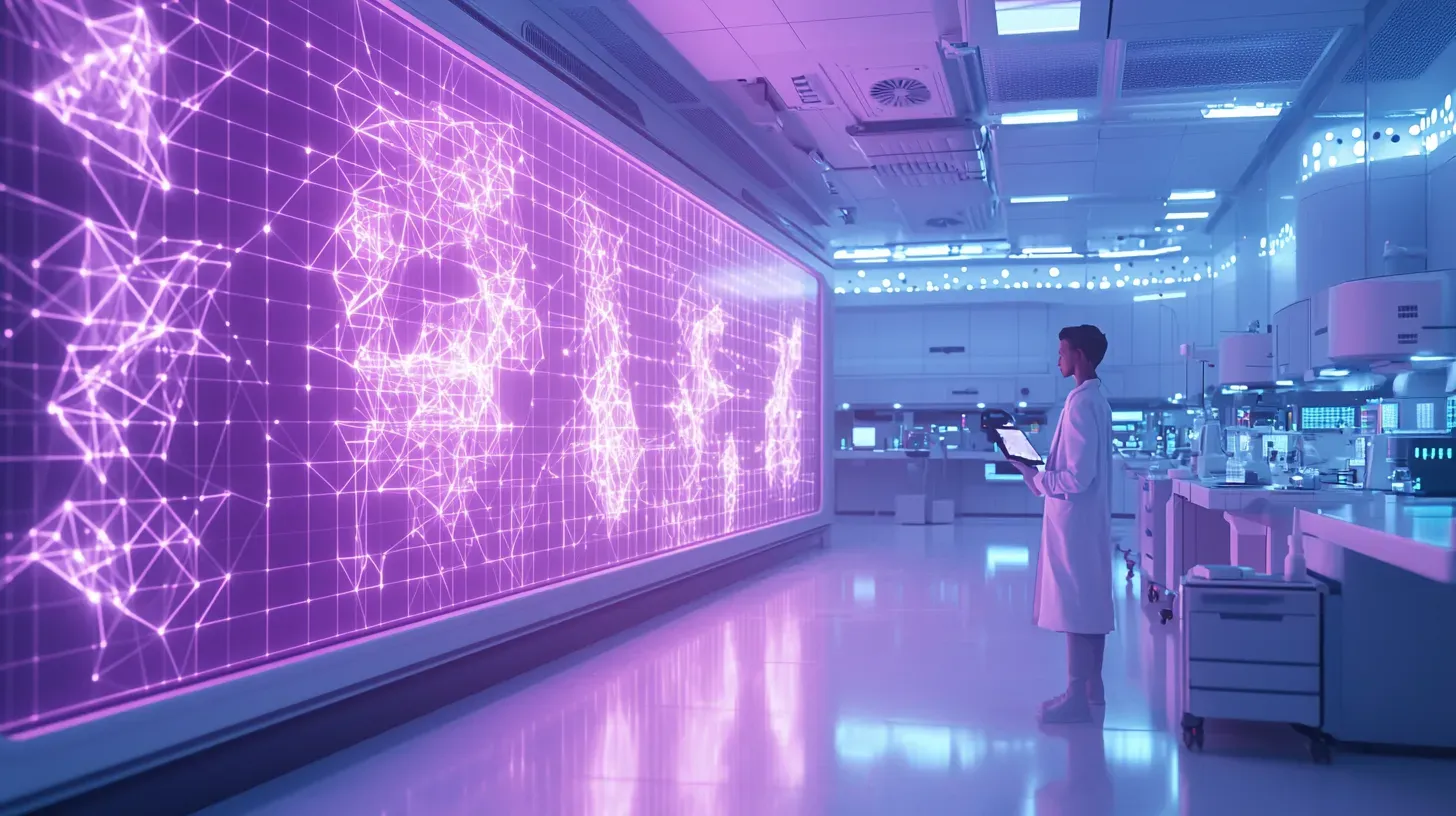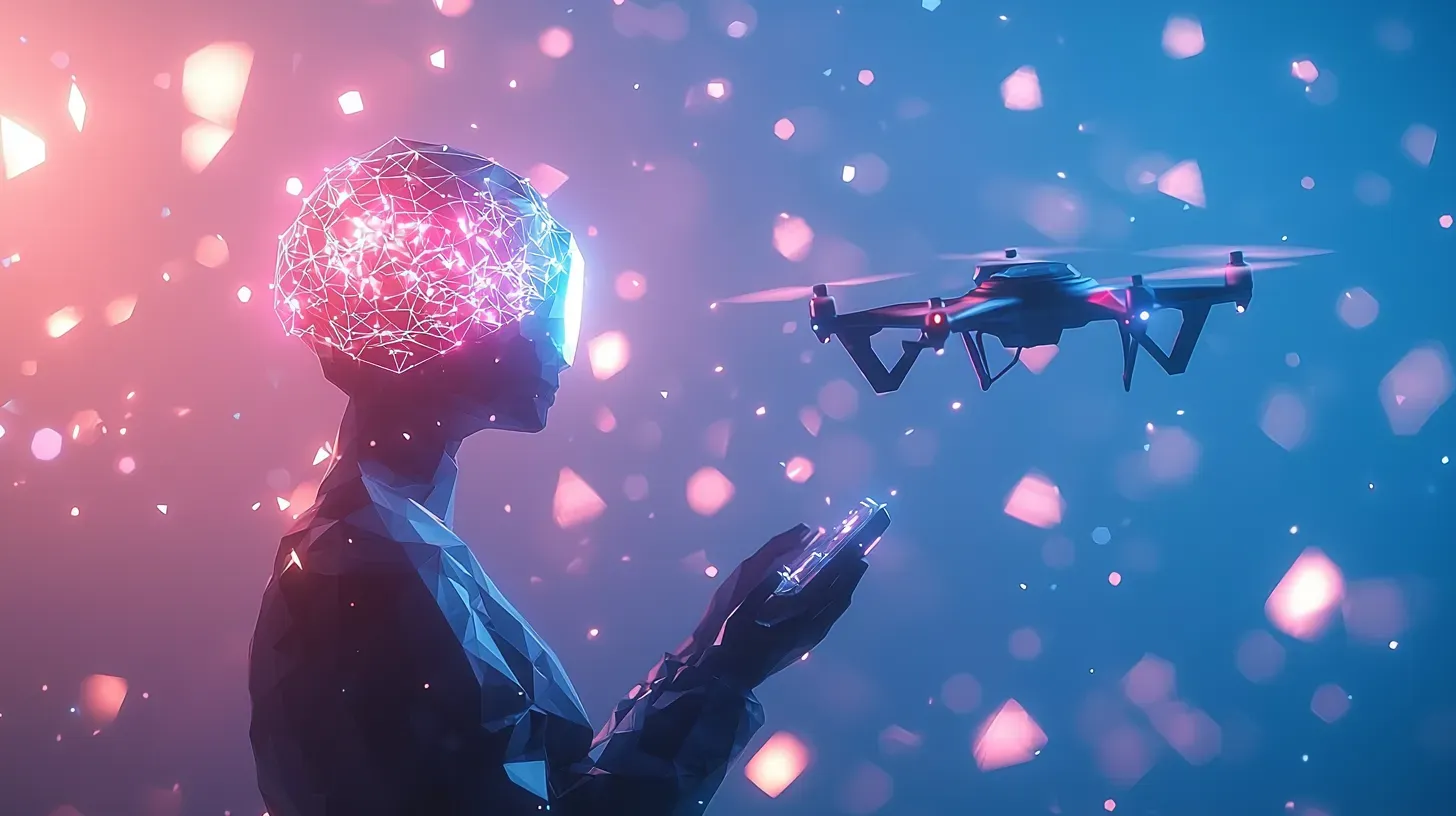A Futurist Speaker's Insight on Understanding Drones

A Futurist Speaker's Insight on Understanding Drones
Drones, also known as unmanned aerial vehicles (UAVs), have gained significant popularity in recent years. These fascinating flying machines have captured our collective imagination and have become an integral part of various industries. As a futurist speaker, I have had the privilege of closely studying drones and their impact on society. In this article, I will provide you with a comprehensive understanding of drone technology and delve into the future of this groundbreaking innovation.
Understanding the Basics of Drone Technology
Before we explore the exciting advancements in drone technology, let's start with the basics. Drones are essentially pilotless aircraft that can be controlled remotely or programmed to operate autonomously. They are equipped with various sensors, cameras, and navigation systems that allow them to perform a wide range of tasks. From aerial photography and videography to search and rescue operations, drones have quickly become versatile tools with immense potential.
One of the key components of any drone is its flight controller, which serves as the brain of the device. It determines the drone's stability, altitude, and flight path. The flight controller utilizes an array of sensors, such as accelerometers and gyroscopes, to gather data about the drone's orientation and movement. By processing this information in real-time, the flight controller can make rapid adjustments to keep the drone stable and on course.
Additionally, drones rely on GPS technology for accurate positioning and navigation. This allows them to execute complex missions with precision and efficiency. The GPS receiver on board the drone receives signals from multiple satellites orbiting the Earth. By triangulating these signals, the drone can determine its exact location and calculate its speed and direction. This information is crucial for tasks that require precise positioning, such as mapping or surveying large areas.
Another crucial aspect of drone technology is the use of remote controllers or ground control stations. These devices enable operators to control the drone's movements and access real-time data from its onboard systems. The remote controller typically consists of a handheld device with joysticks or control buttons. By manipulating these controls, users can pilot the drone, adjust its cameras, and monitor its flight status.
Furthermore, modern drones often feature advanced communication systems that allow them to transmit data and receive instructions from remote locations. This capability enables operators to control drones from long distances, making them ideal for applications such as inspecting infrastructure or monitoring wildlife in remote areas. The communication systems can utilize various technologies, including radio frequencies, Wi-Fi, or even cellular networks, depending on the range and requirements of the mission.
Moreover, the cameras and sensors on drones play a crucial role in their functionality. Drones can be equipped with high-resolution cameras capable of capturing stunning aerial photographs and videos. These cameras can be remotely controlled, allowing operators to adjust the focus, zoom, and exposure settings to capture the perfect shot. In addition to cameras, drones can also be equipped with specialized sensors, such as thermal cameras or multispectral sensors, which enable them to gather valuable data for applications like agriculture or environmental monitoring.
In conclusion, drone technology encompasses a wide range of components and capabilities. From flight controllers and GPS navigation to remote controllers and advanced communication systems, drones have become powerful tools for various industries and applications. With ongoing advancements and innovations, the potential for drones to revolutionize industries and improve our lives is truly exciting.
The Role of a Futurist Speaker in Simplifying Drone Advancements
As a futurist speaker, my goal is to bridge the gap between cutting-edge technology and everyday understanding. I strive to make complex concepts accessible, helping individuals and organizations make informed decisions. When it comes to drones, I break down the intricacies of their functioning and highlight their transformative potential.
During my presentations, I emphasize the latest trends and developments in the field of drones. I discuss emerging technologies such as machine learning, artificial intelligence, and advanced sensors, which are propelling the growth of drones. By providing real-world examples and case studies, I aim to inspire and educate my audience about the astonishing possibilities that drones offer.
One area where drones are making a significant impact is in the field of agriculture. Farmers are now utilizing drones equipped with high-resolution cameras and infrared sensors to monitor crop health, detect pest infestations, and optimize irrigation systems. These advancements not only increase efficiency but also reduce the need for harmful pesticides, leading to more sustainable farming practices.
In the realm of disaster management, drones have proven to be invaluable tools. Equipped with thermal imaging cameras and GPS technology, they can quickly assess the extent of damage after natural disasters such as earthquakes or hurricanes. This real-time data allows emergency responders to prioritize their efforts and provide aid to those in need more effectively.
Furthermore, I address the ethical considerations surrounding drone use. As the popularity of drones increases, questions regarding privacy, safety, and regulations become more prevalent. By engaging in open and honest conversations, I encourage individuals and organizations to think critically about how drones can be integrated responsibly into our society.
For instance, strict regulations are in place to prevent unauthorized drone flights near airports and other sensitive areas. These measures are crucial to ensure the safety of air travel and protect the privacy of individuals. By discussing the importance of adhering to these regulations, I aim to foster a culture of responsible drone usage.
Moreover, I explore the potential of drones in humanitarian efforts. In remote or disaster-stricken areas, drones can deliver medical supplies, food, and other essential items quickly and efficiently. This technology has the potential to save lives and provide aid to those in need, especially in hard-to-reach locations where traditional transportation methods may be limited.
In conclusion, as a futurist speaker, I play a vital role in simplifying drone advancements. By breaking down complex concepts, highlighting real-world applications, and addressing ethical considerations, I strive to inspire and educate my audience about the incredible potential of drones. Through open and honest conversations, we can navigate the ever-evolving world of drone technology and harness its benefits responsibly.
Insights into the Future of Drones
So, what does the future hold for drone technology? The possibilities are truly exhilarating. With advancements in battery technology, drones will have extended flight times, enabling them to cover greater distances and accomplish more complex tasks. This will revolutionize industries such as agriculture, delivery services, and disaster management.
Imagine a world where drones can fly for hours on end, tirelessly monitoring crops and collecting data to optimize agricultural practices. Farmers will be able to identify areas of their fields that require more water or fertilizer, leading to increased crop yields and reduced resource wastage. In the realm of delivery services, drones will be able to transport packages over long distances, reaching remote areas that were previously inaccessible. This will not only improve the efficiency of delivery operations but also provide a lifeline for communities in need of essential supplies.
But it doesn't stop there. Advancements in artificial intelligence will enable drones to operate autonomously, making them more efficient and reducing the need for constant human supervision. Picture a swarm of drones working together seamlessly, each one equipped with sophisticated algorithms that allow them to communicate and coordinate their actions. This level of autonomy will enable drones to perform complex tasks with precision and accuracy.
For instance, in the field of surveillance, drones will be able to patrol large areas, identifying potential threats and relaying information to security personnel in real-time. This will enhance public safety and provide a cost-effective alternative to traditional surveillance methods. In the realm of infrastructure inspection, drones will be able to navigate through complex structures, capturing high-resolution images and detecting any signs of damage or wear. This will enable timely maintenance and prevent catastrophic failures.
Furthermore, drones equipped with advanced sensors will play a crucial role in environmental monitoring. They will be able to collect data on air quality, water pollution, and wildlife populations, providing scientists and researchers with valuable insights into the state of our planet. This information will be instrumental in developing effective conservation strategies and mitigating the impact of climate change.
The future of drones is not just about technological advancements; it's about the endless possibilities they bring. From revolutionizing industries to enhancing public safety and protecting the environment, drones will undoubtedly shape the world we live in. So, fasten your seatbelts and get ready for a future where the sky is no longer the limit.
How a Futurist Speaker Predicts Drone Usage in Different Industries
As a futurist speaker, I closely analyze the potential impact of drones in various industries. In agriculture, drones can assist farmers by providing aerial imaging, crop health monitoring, and precision spraying. This can lead to increased crop yields and more environmentally friendly practices.
In the logistics sector, drones have the potential to revolutionize last-mile delivery. Companies like Amazon and DHL have already started experimenting with drone delivery services, promising faster and more efficient delivery times. This could reshape the way we receive packages and accelerate the overall speed of global commerce.
Moreover, in the field of emergency services, drones can play a significant role in search and rescue missions, forest fire detection, and disaster assessment. Their agility and ability to access hard-to-reach areas make them invaluable tools for first responders and emergency personnel.
Ethical Considerations and Regulations in Drone Technology
As with any new technology, it is essential to consider the ethical implications and establish regulations to ensure responsible use. Privacy concerns arise with the growing use of drones for aerial surveillance. Striking a balance between the benefits brought by drones and the protection of individual privacy is a challenge that requires careful consideration.
Regulatory bodies around the world are working to establish guidelines for drone usage, including licensing requirements, flight restrictions, and safety protocols. These regulations aim to address concerns about airspace congestion, unauthorized use, and potential security threats.
It is crucial for individuals, businesses, and governments to work collaboratively to continually evaluate and adapt these regulations. This collective effort will enable us to harness the full potential of drone technology while ensuring the safety, privacy, and well-being of all individuals.
Conclusion
In conclusion, drones are not just toys or gadgets; they are becoming an integral part of our society. As a futurist speaker, I am fascinated by the endless possibilities that drones offer. The future holds tremendous potential for drones to transform various industries in unprecedented ways. However, it is essential to approach this technology thoughtfully, considering the ethical implications and embracing responsible use.
By providing expert insights, I aim to empower individuals and organizations to navigate the ever-evolving landscape of drone technology. Together, we can unlock the incredible opportunities offered by drones and shape a future where innovation and responsibility coexist harmoniously.
Frequently Asked Questions
1. What are drones and how do they work?
Drones, also known as unmanned aerial vehicles (UAVs), are pilotless aircraft that can be controlled remotely or programmed to operate autonomously. They are equipped with sensors, cameras, and navigation systems that allow them to perform various tasks. The flight controller serves as the brain of the drone, determining its stability, altitude, and flight path. GPS technology is used for accurate positioning and navigation, while remote controllers or ground control stations enable operators to control the drone's movements and access real-time data.
2. What are the applications of drone technology?
Drones have a wide range of applications across various industries. They can be used for aerial photography and videography, search and rescue operations, agriculture monitoring, delivery services, disaster management, surveillance, infrastructure inspection, environmental monitoring, and more. Drones equipped with high-resolution cameras and specialized sensors can gather valuable data for mapping, crop health monitoring, wildlife monitoring, and environmental research.
3. What is the future of drone technology?
The future of drone technology is promising and full of possibilities. Advancements in battery technology will lead to extended flight times, enabling drones to cover greater distances and accomplish more complex tasks. Artificial intelligence will enable drones to operate autonomously, making them more efficient and precise. Drones will revolutionize industries such as agriculture, delivery services, surveillance, infrastructure inspection, and environmental monitoring. They will play a crucial role in enhancing efficiency, public safety, and environmental conservation.
Contact a Futurist Speaker for your event
Are you ready to take your next event to unprecedented heights? Consider hiring Dr. Mark van Rijmenam, a renowned futurist speaker, to captivate your audience with his expert insights into drone technology and its transformative potential. Dr. van Rijmenam's presentations go beyond simply explaining the technology - he brings to light the vast possibilities, ethical considerations, and future implications in a manner that is both engaging and accessible. His unique ability to simplify complex concepts and highlight real-world applications will leave your audience inspired and informed. Don't miss this opportunity to make your event truly memorable. Simply complete the form below and we will be in touch within 24 hours to discuss how Dr. van Rijmenam can bring a future-focused perspective to your event.
Thanks for your inquiry
We have sent you a copy of your request and we will be in touch within 24 hours on business days.
If you do not receive an email from us by then, please check your spam mailbox and whitelist email addresses from @thedigitalspeaker.com.
In the meantime, feel free to learn more about The Digital Speaker here.
Or read The Digital Speaker's latest articles here.





